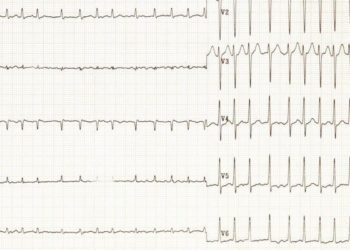Implantable loop recorder screening for atrial fibrillation associated with increased diagnosis of bradyarrhythmia and pacemaker implantations – A post-hoc analysis of the LOOP randomized clinical trial
1. In this post hoc analysis of the LOOP randomized clinical trial, among 6004 participants older than 70 years undergoing implantable loop recorder screening for unknown atrial fibrillation, screening was associated with an incidental diagnosis of sinus node dysfunction or atrioventricular block and increased pacemaker implantations, compared to usual care.
2. Bradyarrhythmia was diagnosed in 20.8% of participants in the implantable loop recorder group vs 3.8% of participants in the control group.
Evidence Rating Level:1 (Excellent)
Study Rundown: With the recent advancements in health technology, there is a growing interest in the potential of heart rhythm monitoring devices to detect arrhythmias. Although much of the interest has been concentrated on tools to detect subclinical atrial fibrillation (AF), there is limited evidence on the potential to detect sinus node dysfunction (SND) and atrioventricular block (AVB). Hence, this study investigated the prevalence and prognostic significance of incidentally diagnosed bradyarrhythmia in persons screened for AF using an implantable loop recorded (ILR) compared with unscreened persons. This was a post hoc analysis of the Implantable Loop Recorder Detection of Atrial Fibrillation to Prevent Stroke (LOOP) randomized clinical trial. 6004 participants, 70 years or older without known AF, were randomized to either the ILR or the control group. The primary outcomes were adjudicated bradyarrhythmia episodes, pacemaker implantation, syncope, and sudden cardiovascular death. Bradyarrhythmia was diagnosed in 2.8% of participants in the control, compared to 20.8% of participants in the ILR group. Sinus node dysfunction was the most common bradyarrhythmia. Risk factors for bradyarrhythmia included higher age, male sex, and prior syncope. A pacemaker was implanted in 2.9% of participants in the control group vs 4.5% in the ILR group. Although there was an increase in bradyarrhythmia diagnosis and pacemaker implantations, there was no change in the risk of syncope or sudden death. A strength of this study was its large sample size; however, a limitation was its lack of prespecified outcomes and analyses due to the nature of its post hoc study design.
Click to read the study in JAMA Cardiology
Click to read an accompanying editorial in JAMA Cardiology
Relevant Reading: Population-based screening for atrial fibrillation
In-Depth [randomized controlled trial]: This study was a post-hoc analysis of the LOOP trial that assessed the prevalence of bradyarrhythmia and its prognostic significance in persons screened for AF using ILR compared with unscreened persons. The LOOP randomized clinical trial occurred in 4 sites in Denmark, with participants recruited between January 2014 and May 2016. A total of 6004 persons without known AF but diagnosed with at least 1 of the following conditions: hypertension, diabetes, heart failure, or prior stroke, were included in this study (mean [SD] age, 75 [4.1] years; 2837 [47.3%] female; 5444 [90.7%] with hypertension; 1224 [20.4%] with prior syncope). Participants were randomized to either ILR screening for AF with treatment of any bradyarrhythmia left to the discretion of the treating physician (n = 1501) vs usual care (n = 5444). The primary outcomes were adjudicated bradyarrhythmia episodes, pacemaker implantation, syncope, and sudden cardiovascular death. Bradyarrhythmia was diagnosed in 172 participants (3.8%) in the control group vs 312 participants (20.8%) in the ILR group (hazard ratio [HR], 6.21 [95% CI, 5.15 – 7.48]; P < .001). Pacemaker implantation took place in 132 participants in the control group (2.9%) vs 67 (4.5%) (HR, 1.53 [95% CI, 1.14 – 2.06]; P < .001) of participants in the ILR group. Additionally, syncope occurred in 120 (2.7%) vs 33 (2.2%) (HR, 0,83 [95% CI, 0.56 – 1.22]; P = .34), and sudden cardiovascular death occurred in 49 (1.1%) vs 18 (1.2%) (HR, 1.11 [95% CI, 0.64 – 1.90]; P = .71) in the control group vs the ILR group, respectively.
Image: PD
©2023 2 Minute Medicine, Inc. All rights reserved. No works may be reproduced without expressed written consent from 2 Minute Medicine, Inc. Inquire about licensing here. No article should be construed as medical advice and is not intended as such by the authors or by 2 Minute Medicine, Inc.






